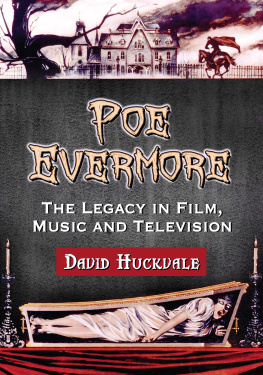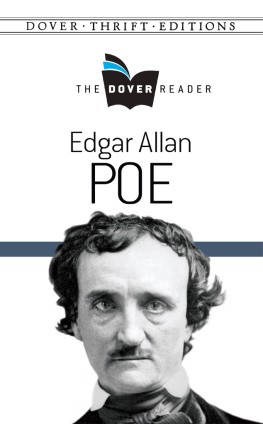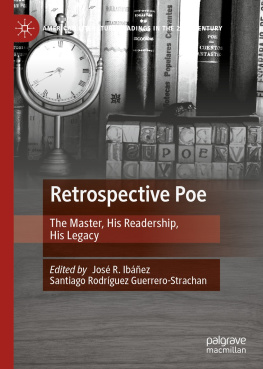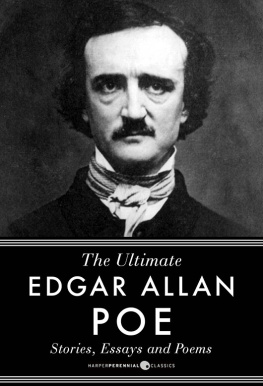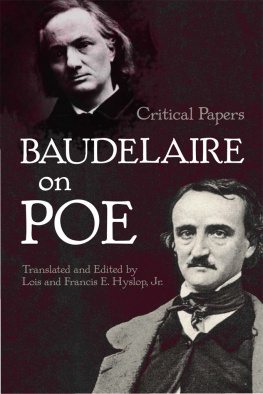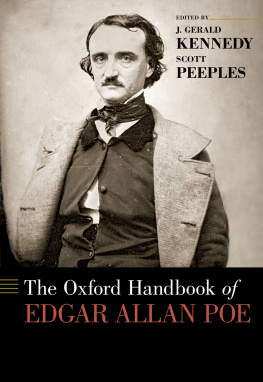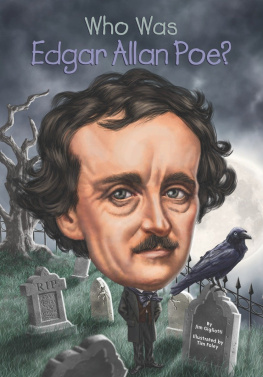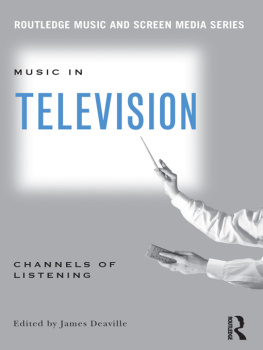Also by DAVID HUCKVALE
AND FROM MCFARLAND
Hammer Films Psychological Thrillers, 19501972 (2014)
The Occult Arts of Music: An Esoteric Survey from Pythagoras to Pop Culture (2013)
James Bernard, Composer to Count Dracula: A Critical Biography (2006; paperback 2012)
Ancient Egypt in the Popular Imagination: Building a Fantasy in Film, Literature, Music and Art (2012)
Visconti and the German Dream: Romanticism, Wagner and the Nazi Catastrophe in Film (2012)
Touchstones of Gothic Horror: A Film Genealogy of Eleven Motifs and Images (2010)
Hammer Film Scores and the Musical Avant-Garde (2008)
Poe Evermore
The Legacy in Film, Music and Television
DAVID HUCKVALE


McFarland & Company, Inc., Publishers
Jefferson, North Carolina
LIBRARY OF CONGRESS CATALOGUING DATA ARE AVAILABLE
BRITISH LIBRARY CATALOGUING DATA ARE AVAILABLE
e-ISBN: 978-1-4766-1721-3
2014 David Huckvale. All rights reserved
No part of this book may be reproduced or transmitted in any formor by any means, electronic or mechanical, including photocopyingor recording, or by any information storage and retrieval system,without permission in writing from the publisher.
On the cover: poster art from House of Usher, 1960 aka The Fall of the House of Usher (Photofest)
McFarland & Company, Inc., Publishers
Box 611, Jefferson, North Carolina 28640
www.mcfarlandpub.com
To Ian Spiby
Preface
This book is primarily a response to the ways in which Edgar Allan Poes work has inspired aspects of twentieth-century culture. It also necessarily concerns itself with some of the major influences upon Poes work and the work itself, in order to illuminate that main objective further. Alphabetically arranged, it is not intended as an exhaustive guide to everything Poe wrote. My aim is to discuss the cultural impact of the most significant tales, essays and poems: on other writers, in art and music and ultimately in film and television.
Poe, the great American synesthete, would surely have approved of this approach. As he himself expressed it: The Poetic Sentiment, of course, may develop itself in various modesin Painting, in Sculpture, in Architecture, in the Dancevery especially in Musicand very peculiarly, and with a wide field, in the composition of the Landscape Garden.1 In film we see all these elements combined with the iconography of the unconscious. For painting, we may substitute photography; for sculpture, the living form; for architecture, the film set; for dance, the movement of the camera; for the landscape garden, the widescreen panorama.
Poe claimed that music was supreme. It is in Music, perhaps, that the soul most nearly attains the great end for which, when inspired by the Poetic Sentiment, it struggles.2 Richard Wagner would have agreed with him, even though he never turned his back on the concept of music-drama, which anticipated the cinema in so many ways. Ralph Vaughan Williams, who scored several films himself, added, film contains potentialities for the combination of all the arts such as Wagner never dreamt of.3
Film is a medium Poe would doubtless have found fascinating in theory, if sometimes disappointing in practice; but for Poe the medium mattered less than the mood it creates and the poetic sentiment it expresses. It is therefore highly appropriate that his work should have inspired responses from so many creative artists in their various differing but often united fields.
From childhoods hour I have not been
As others wereI have not seen
As others sawI could not bring
My passions from a common spring.
from Poes poem Alone

Poe constantly and inevitably produced magic where his greatest contemporaries produced only beauty.
George Bernard Shaw, Edgar Allan Poe, The Nation (London), January 16, 1909

No man, I repeat, has told, with greater magic the exceptions of human life and nature.
Charles Baudelaire [trans. H. Curwen], Edgar Allan Poe: His Life and Works, London 1873
Introduction
The first author I came to love was Edgar Allan Poe. I enjoyed his prose style long before I worked out what it meant. Meaning in Poe came to me later, but I responded immediately and musically to his style. Sometimes, of course, Poe doesnt mean anything. The wan and misty-winged Ashtophet of idolatrous Egypt mentioned in Ligeia1 is a poetic construct. No such god ever existed. Poe invented it, exploiting the sound of his coinage for its mood-manufacturing power. The same applies to his narrators comparison of Ligeias eyes to the gazelle eyes of the tribe of the valley of Nourjahad.2 Poe was an expert in what he called Mystification, and even wrote a story about it. His world is one of moods and images, of emotions and ideas. Psychological action is often favored over dramatic action. The perspective of a single character is preferred to the portrayal of characters interacting with each other, or, at least, the presentation of their point of view.
Many artists have illustrated him: Odilon Redon and Edouard Manet, Arthur Rackham, Aubrey Beardsley and Harry Clarke, Alfred Kubin and Alberto Martinieven the German-born American graphic designer Wilfried Stty. I collected them all and passed many a mesmerized afternoon in contemplation of their respective visions, but I have to admit that no mere image could ever replace the sound of Poe. As his biographer Kenneth Silverman explains, Poe was the first writer in English, or perhaps in any modern literature, to consistently apply to prose fiction some of the techniques of poetry.3
My introduction to Poe was from the movies. Ever since receiving a copy of Denis Giffords APictorial History of Horror Movies for my fifteenth birthday, in which I found fascinating stills of Roger Cormans film adaptations, I had eagerly scanned the television listings for late-night screenings of horror movies that were hard to find in the days before videos and DVDs. Back in those distant 1970s, one relied on television. As an alternative to the Wednesday-afternoon military drill of the Combined Cadet Force, which I, as something of a latent Roderick Usher myself, managed to avoid, my rather old-fashioned British school insisted I re-decorate the living room of two disabled pensioners. While drinking milky tea in their crowded sitting room, and leafing through their copy of the Radio Times (a luxury we never had at home), I read, with a quickening of the heart, that The Tomb of Ligeia (dir. Roger Corman, 1964) was to be shown that very evening. To me, at that time, it would not have been an overstatement to have described my excitement in terms of one of Poes own phrases from the story that inspired this best of Cormans Poe adaptations: I felt that my vision grew dim, that my reason wandered; and it was only by a violent effort that I at length succeeded in nerving myself to the task which duty thus once more had pointed out.4 The memory of that moment is still vivid: the table, the plate of biscuits, the chair (so much more comfortable than a military drill), the racing on the television, and (such is the transformative power of art and the imagination, which flourishes in the most unlikely places) my head full of Poe.
Next page
